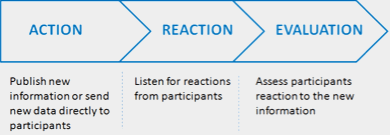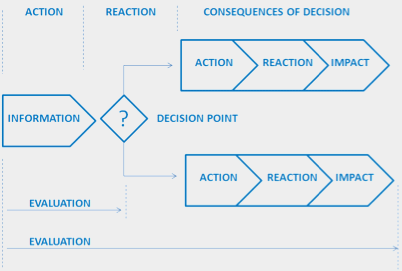Simulation
Within large organizations split into functional departments, team-based scenario training can help break down internal 'silos' as participants share their departmental or specialist knowledge. This allows everyone to reach a shared understanding and build cross-organizational relationships.
Pervasive training
Our scenario-based training is built on a cloud-based technology called Conducttr. Conducttr allows the creation of bespoke real-world simulations for the purpose of employee training, education and evaluation.
Simulations created in Conducttr can be played out across websites, social media, email and text messaging. This makes scenarios more life-like, breaking out of the classroom and desktop computer to play on participants' mobile phones, tablets, TVs and other devices at any time of the day or night. We call this 'pervasive training'.
The key strengths of our approach are:
- Realistic freed from a typical point-and-click desktop questionnaire, participants engage in an experiential learning that feels like real life.
- Relevant bespoke scenarios are developed to specific training goals and in line with our clients values and priorities.
- Adaptive participant decisions are reflected back into the evolving scenario so that the consequences of decisions are learned.
- Pervasive scenarios can play out over any length of time and at any point in time - for real verisimilitude, a scenario can be played while participants are doing their regular jobs.
- Personalized participants receive information relevant to their roles
- Social participants may be encouraged to collaborate or make interpersonal connections outside of their own departments or teams. Collaboration might be one-to-one or collective - in meeting rooms, chat rooms and forums.
Designing scenarios
When designing training scenarios, we work back from the desired learning outcomes to ask what participant reactions are required. We then design scenarios - usually in the form of published information for an unfolding situation - to provoke these reactions.
Evaluations can be performed by a trainer and/or a moderator from the client organization, using information provided by Conducttr.

If participants are to experience the consequences of their actions, their reactions can be fed back into Conducttr to change the course of the story. We call this a 'branching narrative' - meaning that a particular decision actually changes the unfolding story from the participants perspective:

Scenario-based simulation can be applied to any work process in which decision-making is required. In addition to operations simulation, we can offer crisis management, strategy and knowledge-management scenarios designed for you by published, industry-leading experts.
Simulations available:
- Variants Key
 Universal
Universal Financial Services
Financial Services Central Government
Central Government Local Government
Local Government Healthcare
Healthcare Higher Education
Higher Education Third Sector
Third Sector
-
Variants:

 (Real time + ½ day debrief)
(Real time + ½ day debrief)The scenario features a catastrophic failure of controls at a local authority waste-to-energy plant, and the ensuing industrial and environmental accident. The scenario plays in real time over two days, with participants intermittently taking the roles of key local authority and DEFRA decision makers and stakeholders. The scenario is designed to 'branch' so that the decisions made by participants have consequences which change the 'storyline'.
Following the simulation, a ½ day debrief will be carried out with participants. This can have various foci depending on the client's requirements:
- Systems / process failure and its consequences
- Decision-making systems and their consequences
- Inter-departmental and inter-agency co-operation
- Risk management
- Stakeholder management
Please contact us for further information.
- Healthcare Supply Chain Failure
-
Variants:

 (Real time + ½ day debrief)
(Real time + ½ day debrief)This scenario features a potentially catastrophic failure in supply chain management in the NHS. It is based on a real-life issue which arose in 2012, when a series of strong earthquakes in the Emilia Romagna region of Italy resulted in almost complete loss of productive capacity for the company which supplies the NHS with renal dialysis tubing. The scenario is designed to 'branch' so that the decisions made by participants have consequences which change the 'storyline'. The scenario and supporting materials were designed in collaboration with a Fellow of the Chartered Institute of Purchasing and Supply.
Following the simulation, a ½ day debrief will be carried out with participants. This can have various foci depending on the client's requirements:
- Supply chain management failure and its consequences
- Decision-making systems and their consequences
- Inter-departmental and inter-agency co-operation
- Risk management
- Stakeholder management
Please contact us for further information.
